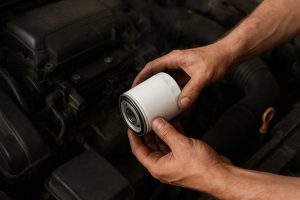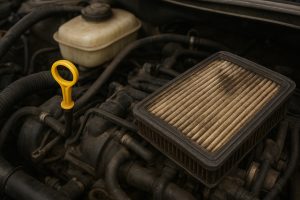Replacing your car’s filters might seem like a simple maintenance task — something you can easily overlook or delay until the next oil change. But professional mechanics know that filters are your engine’s first line of defense against wear, contamination, and poor performance. Understanding how filters work, when to replace them, and what mistakes to avoid can save you money and prevent serious damage.
If you’re planning a replacement yourself, you can also buy Filters online and ensure you’re choosing the right parts for your vehicle.

Why Filters Are More Important Than You Think
Your car relies on several types of filters to keep everything running smoothly:
| Filter Type | Function | Common Replacement Interval | Key Risk if Ignored |
|---|---|---|---|
| Oil filter | Traps metal shavings, soot, and sludge from engine oil | Every 10,000–15,000 km (or each oil change) | Engine wear, bearing damage |
| Air filter | Prevents dust and debris from entering the combustion chamber | Every 15,000–25,000 km | Reduced power, higher fuel consumption |
| Cabin (pollen) filter | Cleans the air entering the cabin through HVAC | Every 15,000–20,000 km | Poor air quality, foggy windows |
| Fuel filter | Keeps contaminants from clogging injectors or carburetors | Every 30,000–60,000 km | Rough idling, misfires, hard starts |
These intervals can vary depending on your vehicle, driving environment, and manufacturer recommendations — so always check your owner’s manual.
What Mechanics See Every Day: The Common Mistakes
Most filter-related problems aren’t caused by poor design or faulty parts — they’re the result of installation errors, neglect, or wrong choices. Here’s what mechanics wish car owners understood:
1. “Cheap filters” often cost more in the long run
Low-cost filters may save you a few euros at checkout, but they can fail prematurely, have poor seals, or filter less efficiently. This leads to contaminants circulating through the system. Mechanics regularly see clogged oil passages or blackened air intake ducts from subpar filters.
2. “It still looks clean” doesn’t mean it’s fine
Many car owners remove the air filter, give it a quick look, and decide it doesn’t need replacing. The truth is, filters can look clean while being heavily restricted internally. Even small clogs can reduce airflow, worsen fuel economy, and increase engine load.
3. Reusing gaskets or O-rings can lead to leaks
Professional mechanics always install new sealing rings on oil and fuel filters. Old ones can harden, flatten, or lose elasticity — causing oil leaks or unfiltered fuel bypassing the system.
4. Wrong fitment = big trouble
Even if a filter “almost fits,” it can allow leaks, air bypass, or vibration-related wear. Mechanics strongly recommend checking part numbers, especially if buying aftermarket parts. Always match the OEM specifications before purchase — you can easily do that when you buy Filters online.
5. Ignoring the service interval shortens engine life
Mechanics often find engines full of sludge or dirty intake manifolds because filters were replaced far beyond their interval. This not only degrades performance but can also trigger error codes and expensive sensor replacements.
Professional Tips for Correct Filter Replacement
Mechanics don’t just swap filters — they inspect, clean, and reinstall with precision. Here’s what they recommend for every DIYer:
Before replacement:
-
Check your service manual for correct part numbers and torque specs.
-
Warm up the engine slightly before oil filter changes for easier drainage.
-
Disconnect the battery when replacing fuel filters on modern engines.
-
Inspect the filter housing for old gasket material, dust, or oil residue.
During replacement:
-
Lubricate new O-rings lightly with clean oil (for oil/fuel filters).
-
Seat the filter evenly — never force it in.
-
Tighten only to the manufacturer’s torque; over-tightening can damage threads.
-
For air filters, check both the housing seal and intake duct clamps.
After replacement:
-
Start the engine and check for leaks or warning lights.
-
Recheck oil/fuel levels after 5–10 minutes of idling.
-
Record the mileage/date of replacement for future maintenance planning.
Filter Efficiency: What Mechanics Actually Look For
Mechanics don’t just rely on the “fit and feel” — they pay attention to a filter’s micron rating, construction, and flow rate. Here’s how they evaluate filters:
| Filter Attribute | What It Means | Why It Matters |
|---|---|---|
| Micron rating | Smallest particle the filter can trap (lower = finer) | Determines filtration quality and protection level |
| Efficiency % | % of particles filtered at a specific size | Higher efficiency means cleaner oil/air/fuel |
| Bypass valve | Opens when filter clogs to maintain flow | Protects engine during temporary overpressure |
| Build quality | Metal end caps, strong pleats, proper glue joints | Prevents collapse or leaks under pressure |
A high-quality filter isn’t just a brand — it’s about verified specs, reliable sealing, and proper flow balance.
When to Replace Filters: Beyond the Manual
Mechanics often adjust replacement schedules based on real-world conditions:
-
Frequent city driving → Replace air filters sooner (dust, smog, stop-and-go).
-
Rural or off-road use → Inspect more often due to dust and pollen.
-
Cold climates → Shorten oil filter intervals; condensation accelerates sludge.
-
Low-quality fuel regions → Replace fuel filters twice as often.
| Driving Condition | Filter Type Most Affected | Suggested Adjustment |
|---|---|---|
| Dusty/off-road | Air, cabin | Replace 30% earlier |
| Stop-start traffic | Oil | Replace 10–20% earlier |
| High humidity / cold weather | Oil, cabin | Check every 6 months |
| Heavy towing / high load | Oil, fuel | Shorten interval by 25% |
Signs Your Filters Need Immediate Attention

Mechanics suggest watching for these early warning signs that a filter is overdue for replacement:
-
Check-engine light or air-flow sensor error
-
Reduced engine power or hesitation
-
Increased fuel consumption
-
Unusual noises from intake or exhaust
-
Persistent musty smell in the cabin
-
Oil darkening unusually fast after change
Ignoring these can lead to much bigger (and costlier) repairs down the line.
Final Thoughts
Mechanics know from experience that small maintenance tasks — like timely, correct filter replacement — make a huge difference in your car’s reliability and performance. Don’t cut corners by choosing “almost right” parts or delaying service. Always use filters that meet or exceed OEM specs, and double-check the installation for a perfect seal.
If you’re ready to replace yours, it’s easy to buy Filters online with the correct size, rating, and compatibility for your vehicle.
By understanding what your mechanic knows about filters — and applying the same attention to detail — you’ll keep your car cleaner, quieter, and more efficient for years to come.